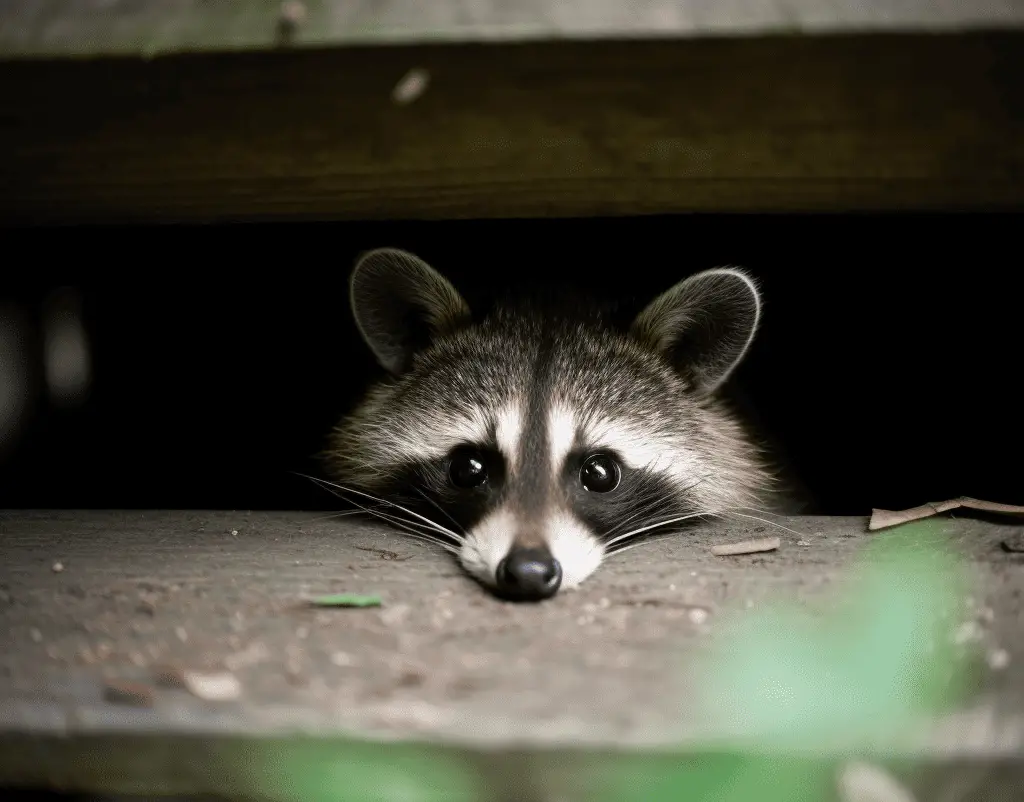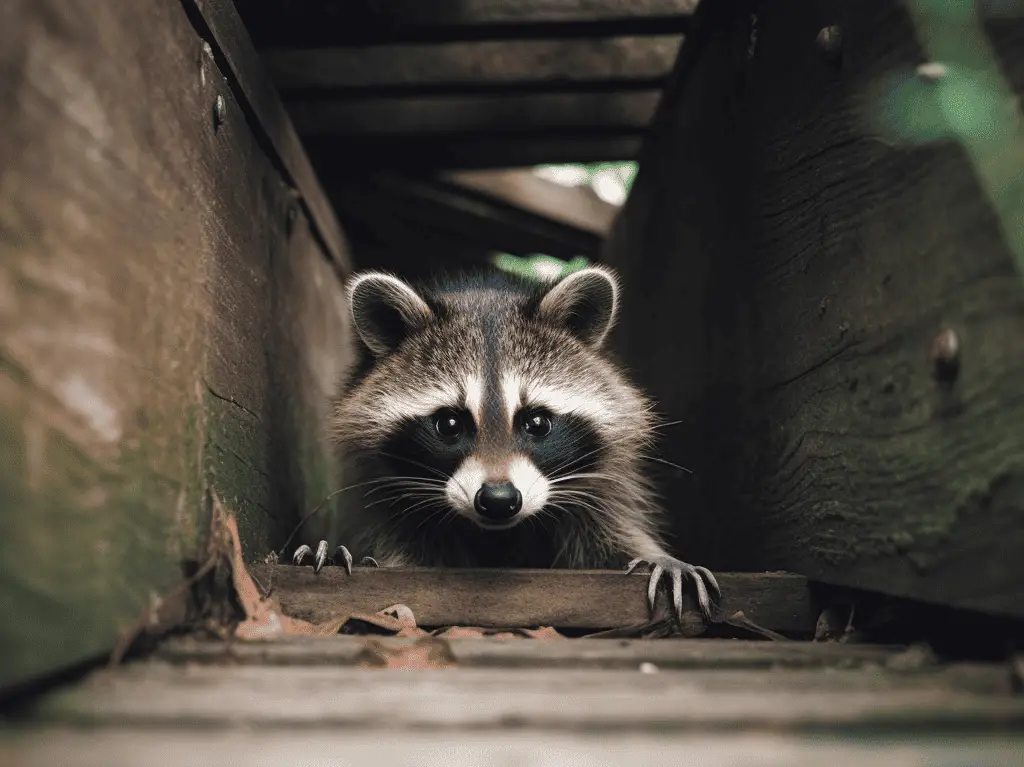Having raccoons take up residence under your deck can be quite a nuisance. These nocturnal creatures are known for their mischievous behavior and can cause significant damage to your property.
In addition to being destructive, raccoons are also carriers of various diseases, which can potentially be transmitted to humans and pets. Therefore, it’s crucial to address the issue promptly and find effective ways to get rid of them.
Removing Attractants
Secure Food Sources
One of the main reasons raccoons are attracted to your deck is the availability of food sources in the surrounding area. Make sure to:
- Store pet food indoors to avoid raccoons feasting on it at night.
- Lock up outdoor compost bins to prevent raccoons from digging into them.
- Pick up fallen fruits near the deck, as raccoons are known to be attracted to fruit trees.
Manage Bird Feeders
Raccoons love bird feeders as they are an easy source of food. To manage this, consider the following:
- Install baffles to prevent raccoons from climbing up the pole and reaching the feeder.
- Place bird feeders away from your deck, preferably near the edge of your lawn or garden, so raccoons are less likely to wander under the deck.
Eliminate Water Sources
Raccoons require water sources for survival, so eliminating these sources can help deter them from your property:
- Remove standing water from your lawn, garden, or other areas near your deck.
- Empty bird baths at night, or consider relocating them farther away from your deck.
Proper Waste Disposal
Good waste management is essential to keeping raccoons away from your property:
- Secure garbage cans using either bungee cords or weights to keep raccoons from opening and rummaging through the trash.
- Clean up after outdoor meals by removing food leftovers, cleaning up spills, and wiping down surfaces.
- Regularly clean up yard debris, such as fallen leaves and branches, that can provide shelter for raccoons.
Raccoon-Proofing Your Deck and Home

Many homeowners face the challenge of raccoons living under their decks or causing damage to their gardens and property. By taking preventive measures, you can ensure that these critters stay away from your home. In this section, you’ll learn about sealing holes and gaps, protecting your plants and garden, and installing one-way doors.
Seal Holes and Gaps
One of the first steps to raccoon-proofing your home is to identify any potential entry points, such as holes, gaps, and weakened areas. Inspect under your deck, around the foundation, and even in your attic or chimney. Seal these openings promptly to prevent raccoons from seeking shelter in your home.
Remember to use sturdy materials, as raccoons are persistent and capable of chewing through weaker ones.
Protect Plants and Garden
Raccoons are attracted to gardens and plants, especially those with edible offerings like corn and other vegetables. To protect your garden from these masked intruders:
- Install a fence around the garden area with a height of at least 5 feet to discourage raccoons from climbing over.
- Use deterrents like motion-activated sprinklers or ultrasonic repellents to scare off raccoons.
- Consider planting less attractive vegetation or rotating your crops seasonally.
Install One-Way Doors
When a raccoon has taken up residence under your deck or shed a one-way door is an effective way to evict it safely. These doors allow the animal to exit the space but prevent it from returning.
Ensure that the one-way door is installed properly, and keep an eye on the area for a few days to confirm the raccoon is gone. Afterward, seal the entry point to prevent any future visits.
Employing Deterrents
Utilize Light and Noise
Raccoons prefer to stay in dark and quiet places. To discourage them from living under your deck, install bright lights and play a radio on a talk show station. The constant light and noise will make the area less appealing for raccoons.
Natural Repellents
Using natural repellents like smell is an effective method to deter raccoons. You can try soaking rags in cider vinegar or sprinkling cayenne pepper around the perimeter of your deck. The strong smell and taste of these substances are unpleasant for raccoons, making them less likely to seek shelter under your deck.
| Natural Repellent | Description |
|---|---|
| Cider Vinegar | Soak rags in vinegar and place them around the deck. |
| Cayenne Pepper | Sprinkle cayenne pepper around the perimeter of your deck. |
Install Wildlife-Proof Fences
To prevent raccoons from reaching your deck, consider installing wildlife-proof fences. These fences should be dug at least 1 foot into the ground and extend at least 3 feet above the ground. The top of the fence should be angled outwards to prevent raccoons from climbing over it. This deterrent method will ensure raccoons stay away from your deck.
Remember to regularly inspect and maintain these deterrents to keep raccoons away and ensure a raccoon-free environment under your deck.
Dealing with an Infestation

Professional Assistance
When dealing with a raccoon infestation under your deck, it is essential to seek professional assistance from an expert in wildlife removal.
Raccoons can cause significant harm, and their presence often results in noise, mess, and damage to your property. Professionals have the expertise and tools to safely and humanely remove raccoons, ensuring minimal disruption to you and your home.
Safe Trapping Methods
It is crucial to utilize safe trapping methods which do not harm the raccoons. Professionals may employ various techniques, such as live traps or one-way doors, which allow the raccoon to leave but not return. Bait, like sardines, can be used to lure raccoons into the trap.
Be mindful of mother raccoons and their offspring, as separating them can cause distress and may even lead to aggressive behaviors.
Understanding Dangers and Risks
Raccoons are known carriers of several zoonotic diseases and parasites, including rabies, leptospirosis, and baylisascaris roundworms. Hence, it is essential to avoid direct contact with raccoons and their nesting areas. In addition, raccoons have sharp claws, strong jaws, and night vision, which can pose a danger to humans and pets if provoked.
Moreover, raccoons can cause damage to your deck and surrounding areas as they search for food and shelter. They might have insects, worms, or parasites present in their nesting areas, which can be a nuisance and cause additional risks.
It is important to note that the objective is to remove raccoons from under your deck safely and humanely. Employing scare tactics or loud noise to drive them away might work temporarily, but it is not a long-term solution and can stress the animals, prompting aggressive behaviors.
Recognizing Wildlife and the Environment
Respecting Natural Habitats
Raccoons and other nocturnal animals, such as bats and owls, usually prefer to live in natural environments like forests, tree hollows, and lakes. These habitats provide them with everything they need to live, including food, shelter, and safety from predators. However, sometimes raccoons can find their way to our homes, seeking food and shelter.
It is important to respect the natural habitats of all wildlife, including nocturnal creatures. Disturbing their habitats can lead to an imbalance in the ecosystem. Here are a few tips to help you respect natural habitats:
- Avoid disturbing nesting areas of nocturnal animals in forests and other habitats.
- Keep your yard clean from food waste that might attract raccoons.
- Plant native species in your garden to give local wildlife a more natural environment.
Promoting Overall Safety and Balance
To maintain a healthy wildlife population and environment, it’s important to promote overall safety and balance for both humans and animals. Some measures you can take include:
- Secure your garbage cans and compost bins to prevent raccoons from accessing them.
- Remove any items from your yard that could act as hiding spaces, like piles of wood or dense vegetation.
- Provide raccoons with a more suitable habitat away from your home. Create a small, wildlife-friendly space further away from your deck, offering raccoons an alternative place to go.
Some common items raccoons might look for in your yard include peas, potatoes, and wool. Be careful and store these appropriately to avoid attracting raccoons.
Identifying the Presence of Raccoons
Being able to recognize the signs and footprints of raccoons in your area can help you address the issue as soon as possible. Some signs that raccoons might be living under your deck include:
- Tracks: Raccoon footprints are distinctive and can be identified next to your deck or around your property.
- Noises: Raccoons are mostly nocturnal, so listening for rustling or scurrying noises at night can indicate their presence.
- Damage: Raccoons might dig up your garden or rummage through your trash cans, leaving behind a mess.


